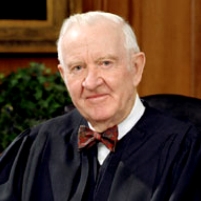Supreme Court Overturns 23-Year-Old Law Prohibiting Interrogations without a Lawyer Present
Thursday, May 28, 2009
 John Paul Stevens
John Paul Stevens
Law enforcement officers can continue interrogating accused criminals even after they have requested legal counsel, now that the U.S. Supreme Court has overturned a landmark ruling from the mid-1980s. In a ruling on Tuesday (Montejo v. Louisiana), the conservative wing of the high court threw out the 1986 opinion stemming from a Michigan case that forbade police from questioning a defendant once he or she invoked their right to counsel at an arraignment.
The majority in the 5-to-4 ruling, consisting of Justices Antonin Scalia, Anthony Kennedy, Clarence Thomas, Samuel A. Alito Jr., and Chief Justice John G. Roberts Jr., said the 1986 precedent proved “unworkable” for law enforcement and provided only “marginal benefits” to the legal system. The Obama administration supported overturning the precedent, as did officials from 11 states.
The ruling provoked an angry dissent, led by Justice John Paul Stevens, who wrote the 1986 decision. Stevens argued the court’s decision dishonored “a fundamental right” that should be guaranteed to accused. Stevens chose to read his dissent aloud before the court, the first time a Supreme Court justice has done so during this term.
-Noel Brinkerhoff
Justices Ease Rules on Questioning (by David Stout, New York Times)
Montejo v. Louisiana (U.S. Supreme Court)
- Top Stories
- Unusual News
- Where is the Money Going?
- Controversies
- U.S. and the World
- Appointments and Resignations
- Latest News
- Musk and Trump Fire Members of Congress
- Trump Calls for Violent Street Demonstrations Against Himself
- Trump Changes Name of Republican Party
- The 2024 Election By the Numbers
- Bashar al-Assad—The Fall of a Rabid AntiSemite






Comments